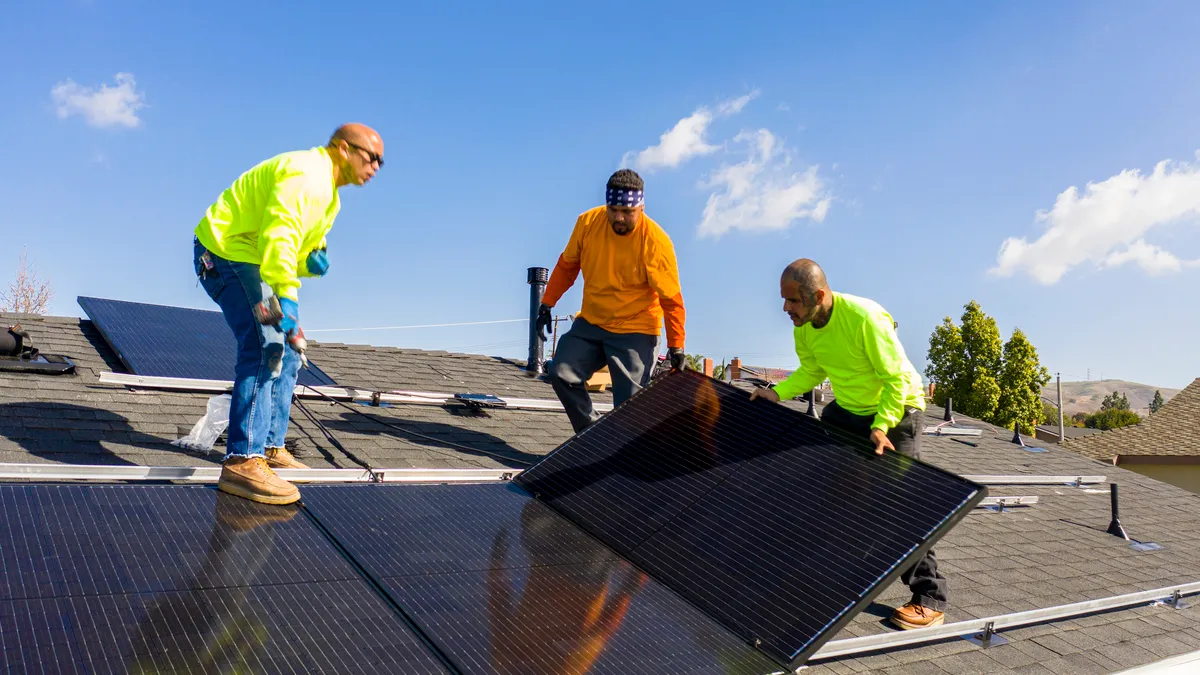Dive Brief:
-
Three of North Carolina’s largest rooftop solar installers have reached an agreement with Duke Energy to put off the implementation of a new time-of-use rate until at least 2026, according to a settlement filed Thursday with the North Carolina Utilities Commission.
-
Delayed implementation of the time-of-use rate structure will give the industry more time to adjust its business model and to negotiate a series of incentives linked to Duke's carbon plan, according to Dave Hollister, founder and president of Sundance Power Systems.
-
While Hollister and other parties to the settlement believe the incentives approach could prove to be an interesting model for expanding solar generation, some other industry and environmental groups continue to oppose Duke Energy’s plans to reform net metering.
Dive Insight:
Duke Energy has agreed to hold off on implementing time-of-use fees for North Carolina customers with rooftop solar panels, pending regulatory approval, while discussion of an incentives package intended to replace net metering continues.
The settlement agreement proposes to replace a series of time-of-use based rates introduced in late 2021 with a “bridge” program that will allow customers with rooftop solar to continue to participate in monthly net metering through at least 2026. Individual customers would be allowed to remain on the bridge rate for 15 years after the date of the installation of their rooftop array, although the bridge rate would be discontinued if the North Carolina Utilities Commission approves a package of incentives equivalent to at least 60 cents per watt, according to the settlement.
The settlement, which is subject to approval by the North Carolina Utilities Commission, will give Duke Energy more time to work out the details of those incentives, according to Lon Huber, senior vice president of pricing and customer solutions for Duke Energy. It was also successful at addressing industry concerns and building a stronger coalition working on renewable energy in North Carolina, Huber said.
“It’s really making sure that we have that wide tent...where we are all working together, so there’s no blind spots and we continue to work together to make sure that we are successful in the regulatory arena,” Huber said. “It’s partly that, and then there’s also some more certainty that the solar industry can plan around.”
Sundance Power Systems intervened in the net metering case alongside two other solar installers in early 2022. Duke Energy had proposed to implement time-of-use fees for rooftop solar in both North Carolina and South Carolina at the time, but a settlement in South Carolina with several solar industry and environmental groups had proposed a series of incentives intended to offset the effect of the new rate schedule on the solar industry. However, regulators declined to implement the incentive package in South Carolina, leaving only the time-of-use fee schedule.
“What that left was a really bad deal for solar in South Carolina, and we saw that this might happen in North Carolina as well,” Hollister said, prompting Sundance Power Systems to comment on the case.
The bridge rate proposed in the settlement, Hollister said, provides a temporary solution, but one he hopes will allow more time for the incentives package to be discussed in a separate proceeding, as currently required by state law. The settlement requires all parties to advocate for the creation of the incentives, and Hollister said they have agreed to support state legislation as necessary to allow Duke Energy to consider customer-generated renewable energy that is consumed on site to be considered a demand-side energy resource.
“If the energy you consume on-site is not part of the [cost shifting] equation, that changes the entire equation,” Hollister said. “So this is a win-win for everyone if we can establish a precedent that allows for self-consumed renewable energy to be considered energy efficiency.”
Huber said Duke Energy also hopes to tie those potential demand-side energy savings to their state-mandated decarbonization plan, which was released last week but will be subject to additional deliberation before the utility commission. The company also remains committed to reviving the incentives package in South Carolina, he said.
However, some North Carolina groups remain opposed to the settlement, including climate justice group NC WARN.
“We appreciate that the solar companies are in a really difficult situation,” NC WARN executive director Jim Warren said. “Duke Energy from the outset has been making clear to earlier settlers and to these latest ones, that if they don’t go along with Duke, then Duke will try to ram through something that is even worse than the first deal. So it’s a tough situation, but it is clear that it is a step backward and I know that lots of our allies are going to continue to fight this.”
Warren said he believes Duke has intentionally undervalued solar in proceedings to date in order to prevent the adoption of technologies that would disrupt the utility’s business model. He said NC WARN and its allies would continue to fight changes to Duke’s net metering program until the North Carolina Utilities Commission has completed an independent cost-benefit analysis of the program.














